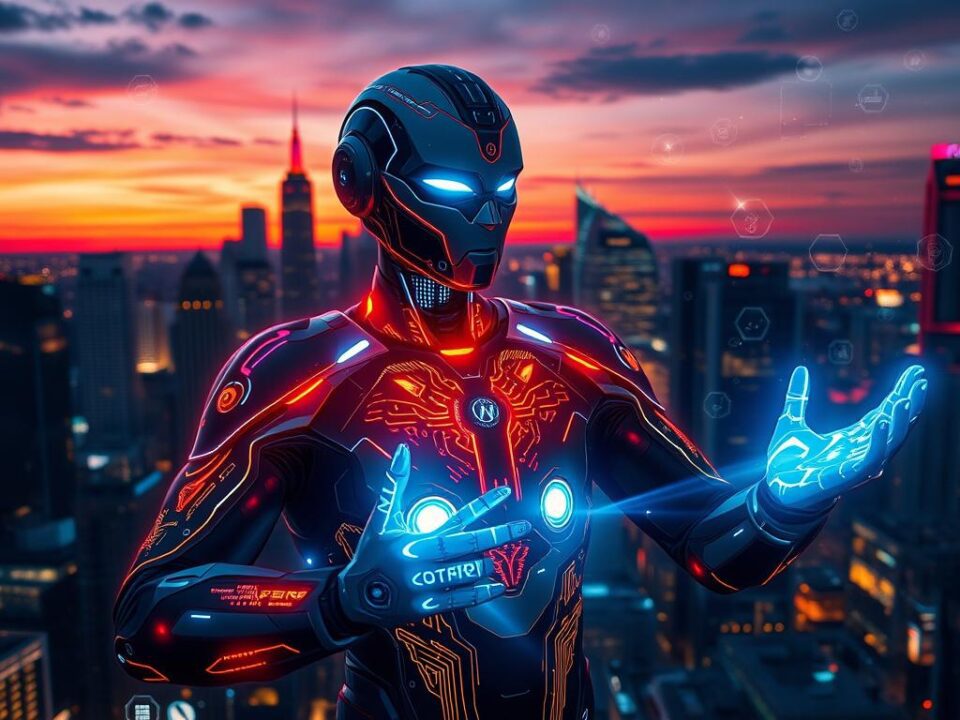Riley, the AI police detective, is changing how crimes are solved. This advanced technology uses smart analysis and real-time data. It’s making a big difference in law enforcement.
Riley helps with many tasks, like analyzing crime scenes and questioning suspects. It can look through lots of information quickly. This makes it a key tool for solving crimes fast and keeping communities safe.
Riley combines artificial intelligence with human skills. This mix is changing how police work. It gives officers the tools they need to solve tough cases efficiently.
Introduction to AI in Policing
The world of law enforcement is changing fast, thanks to artificial intelligence (AI). AI in law enforcement is making a big difference. It helps police officers and investigators do their jobs better, from analyzing crime scenes to predicting crimes.
AI is great at handling lots of data quickly. Police detective AI systems like Riley can look through huge amounts of information. They find patterns and give insights to officers, helping solve crimes faster. This is especially useful in fighting financial crimes, like money laundering.
AI tools also help police deal with the challenges of city life and high public expectations. Crime-solving technology like AI-driven crime mapping helps track suspects and break up crime groups. This is key because criminals are using AI for crimes like deepfakes and identity theft.
“AI is rapidly transforming law enforcement and digital forensics, allowing police to process massive volumes of data, solve cases more quickly, and protect officers from exposure to traumatic content.”
As AI becomes more important in policing, agencies need to keep up. They need the right tools and training. By using these technologies, police can make their work more open, gain trust from the community, and work more efficiently. This makes our communities safer.
Meet Riley: Your AI Detective Partner
In the world of modern law enforcement, a new AI detective partner has arrived – Riley. This advanced artificial intelligence system is changing how police investigations are done. It offers insights and analytical skills that help human officers.
Riley can recognize faces, identify objects, and analyze crime scenes with great detail. It has a sharp memory and can handle lots of data. This AI detective finds connections and patterns that might be missed. It works with law enforcement databases to give officers all the information they need.
- Facial recognition technology to identify suspects
- Object identification to gather evidence from crime scenes
- Advanced data analysis to uncover hidden links and patterns
- Integration with law enforcement databases for comprehensive information
Riley working with human police officers is a strong team. This AI detective partner is changing how investigations are done. It makes solving crimes more efficient and effective.
“Riley has become an indispensable tool in our investigations. Its ability to process data and uncover connections that our team might have missed is truly invaluable.”
As AI in law enforcement grows, Riley shows the power of AI detective partners in modern policing. With its advanced features and work with human officers, Riley is set to be a big change in law enforcement AI.
The Role of AI in Modern Investigations
AI is changing law enforcement, making investigations better. It helps with crime scene analysis and predictive policing. This technology is changing how we solve crimes.
AI uses advanced image processing and pattern recognition. Tools like Riley can spot evidence and analyze photos. This helps find clues that humans might miss, speeding up investigations.
In predictive policing, AI is a game-changer. It looks at crime patterns to predict future crimes. This lets police focus on preventing crimes, making communities safer.
The director of the U.S. National Geospatial-Intelligence Agency estimated that based on current rates of data growth, the agency would need over 8 million additional analysts by 2037 to process all imagery data requiring analysis.
AI makes investigations more efficient and accurate. With more digital evidence, AI is key to handling data. It ensures important information is found.
As AI’s role in investigations grows, law enforcement must adapt. Using this technology helps solve crimes faster. It makes communities safer for everyone.
How Riley Assists with Real-Time Data Processing
Riley is an advanced AI detective that excels in real-time data processing. It gathers info from police databases, surveillance cameras, and social media. This helps Riley quickly spot patterns and trends.
With its powerful AI data analysis, Riley can find connections and crime patterns that humans can’t. It uses machine learning to analyze data fast and accurately. This way, Riley can suggest actions to law enforcement in seconds.
“Riley’s real-time data processing capabilities have been a game-changer for our department. The insights it provides have allowed us to respond to emerging situations much more effectively, ultimately leading to more successful resolutions of complex cases.”
Riley helps by analyzing data from different sources in real-time. It watches live feeds from cameras and social media for leads or suspicious activities. Then, it compares this info with crime history and other factors to give detailed reports to officers.
Riley gives law enforcement a big advantage in fighting crime and keeping communities safe. As technology in policing grows, tools like Riley are key for modern agencies to stay ahead.
Case Studies: Riley in Action
Riley, an AI police detective, has shown its skills in solving old and new cases. It uses AI case studies to find leads that humans might miss. This helps in solving crimes more effectively.
In one historical case, Riley looked at old evidence and files. It found patterns and clues that were missed before. This led to solving a cold case from decades ago, giving closure to families.
For modern investigations, Riley quickly sorts through data. This helps in finding suspects and gathering evidence faster. It has made solving cases quicker and more efficient for police.
“Riley’s ability to process vast amounts of data and identify critical connections has been a game-changer for our department. It’s like having an extra detective on the team, one that never gets tired or distracted.”
The use of AI like Riley is changing policing. It helps solve more cases and makes communities safer. This builds trust and confidence in law enforcement.
The Technology Behind Riley
Riley, the AI police detective, uses machine learning algorithms and natural language processing. These technologies help Riley analyze lots of data. It learns from past cases and gets better over time.
The natural language processing lets Riley understand human language. This makes it easier for officers to work with Riley. It helps them find what they need fast, saving time.
But, using AI police technology comes with challenges. For example, ShotSpotter’s tool has made mistakes, like wrongly accusing Michael Williams. There are also worries about bias, racism, and privacy issues.
Still, machine learning algorithms in policing are promising. As tech gets better, police must be careful with AI tools. They need to be open and focus on fairness to keep justice and safety.
“AI in law enforcement and legal professions is warned to have risks like introducing bias, promoting racism, and leaking private information according to experts.”
User Experience: Interacting with Riley
Riley, the AI police detective, has a user-friendly interface. It makes it easy for law enforcement to work with it. The interface is easy to navigate, gives quick access to important info, and lets officers customize their dashboards.
Officers can set their own parameters, choose what data to focus on, and create alerts. This makes the investigation process smoother. The customization and personalization ensure Riley meets each case’s unique needs, improving the AI user experience.
A 2022 study by J. Pete Blair and Aaron Duron in Police Journal found that officers are shot in one out of every six active shooter events in the U.S. Riley’s police detective interface gives officers real-time data and support. This could help reduce the risks they face in dangerous situations.
“The Glendale Police Department in Southern California is set to launch its Real-Time Intelligence Center (RTIC) which will integrate multiple real-time data sources and provide information to officers in the field.”
Riley’s design makes it easy for law enforcement to use AI effectively. It keeps improving based on officer feedback and new needs. This keeps Riley at the top of technology in policing, helping officers solve cases better and faster.
- Intuitive navigation and quick access to relevant information
- Customizable dashboards and investigative parameters
- Seamless integration of real-time data sources
- Continuous refinement of the user experience
Riley’s design focuses on what law enforcement needs. It ensures a smooth and empowering AI user experience. This boosts the abilities of police officers in today’s digital world.
Ethical Considerations when Using AI in Policing
The use of AI in policing brings up big ethical considerations. These include privacy and fairness. Riley, the AI police detective, has safeguards to protect privacy while helping in investigations.
To make sure things are fair and objective, the AI gets checked often. It’s tested for bias to avoid unfair outcomes. This is key because AI can carry over biases in law enforcement data.
Privacy concerns are big when using AI in law enforcement. AI in policing raises questions about data privacy and security. There’s a risk of misuse of personal info.
“At least 117 million Americans are included in databases where facial recognition searches are conducted.”
It’s crucial to tackle these ethical issues to use AI in policing responsibly. Law enforcement, policymakers, and the public need to talk more. This will help set clear rules for fair law enforcement.
- Ongoing audits and bias testing to prevent discriminatory outcomes
- Robust data privacy and security measures to protect personal information
- Transparent communication about the capabilities and limitations of AI in policing
- Collaboration with community stakeholders to address AI ethics in policing
By tackling these ethical considerations, law enforcement can use AI wisely. They can do this while keeping privacy and fairness at the core of fair law enforcement.
Training Officers to Use AI Tools
AI technologies like Riley are becoming key in law enforcement. Police departments are now training officers to use these tools well. They offer workshops and seminars that teach both the basics and practical use of AI.
Officers learn to use AI tools like Riley in their work. They learn to understand the insights from these tools and apply them in real cases. This training helps them improve their work and make better decisions for public safety.
These AI police training and law enforcement workshops focus on the importance of understanding AI. Officers learn to use their judgment, especially in legal matters. This is because AI reports may not always meet legal standards.
“The policy prohibits officers from using artificial intelligence in investigatory matters such as writing reports, drafting warrants, completing forms, or tasks requiring detailed narrative input, as AI-generated reports may not meet the legal standards of human judgment,” explains legal scholar Andrew Ferguson.
The training also covers the ethics of using AI in policing. It teaches officers about privacy, bias, and transparency. This training is key to using AI responsibly in law enforcement.
The future of AI in law enforcement looks bright. With good training, officers can use these technologies to better serve their communities. As AI tools get better, law enforcement must keep training officers to use them wisely and ethically.
Success Stories: Riley Saves the Day
The use of AI, like the AI police detective Riley, has brought about amazing success stories. These stories have changed law enforcement and made communities safer. Police officers give thanks to Riley for making investigations easier, finding important clues, and helping solve tough cases.
Officer Cal Edwards shares a story of how Riley helped catch a notorious hacker, Joseph Riley. Riley noticed strange calls from his home. Officer Edwards and Riley worked together to track down the hacker. They got a search warrant and found evidence that led to Joseph Riley’s arrest.
“Riley’s ability to quickly analyze and connect the dots in this case was truly remarkable. Without the AI’s assistance, we may have never been able to build a strong enough case to bring this criminal to justice,” said Officer Edwards.
Riley’s help has made a big difference in the community. People feel safer and cases are solved faster. This has made them trust the police more. As one resident of Coral Gables, Florida, noted, “Knowing that the police have advanced tools like Riley to help keep our neighborhood safe gives us a great sense of security.”
These stories show how AI is changing policing for the better. It helps law enforcement protect and serve their communities better. As AI like Riley gets better, the future of law enforcement looks bright for keeping everyone safe.
Future of AI in Law Enforcement
The future of AI in law enforcement is bright. Advances in machine learning, natural language processing, and computer vision are on the horizon. These will make AI detectives like Riley even better at solving complex cases. AI will take on more tasks, but it will always work with human officers.
Groups like Black Lives Matter have pushed for police reform. High-profile cases of police misconduct have made this urgent. AI can make police work more efficient. For example, AI can quickly identify suspects and make sensitive information from cameras more transparent.
Body-worn cameras are becoming common in law enforcement. AI will be key in sorting through the huge amounts of data they produce. Private companies are already using AI to analyze this footage. This lets officers do their main jobs better. Researchers are also using AI to find ways to improve policing.
But, there are challenges and ethics to consider with AI in law enforcement. Still, the benefits are clear. AI can make us safer, more transparent, and support our officers. As AI evolves, we’ll see new ways it will change policing and law enforcement.
“AI-powered solutions can help streamline workflows and analyze evidence more efficiently, enabling officers to focus on their core duties.”
Conclusion: The Promise of AI Police Detectives
The arrival of AI police detectives like Riley marks a big leap in law enforcement tech. It brings many benefits that can make communities safer. With AI, machine learning, and deep learning, police can solve cases faster and better.
AI can look through huge amounts of data quicker and more accurately than humans. This helps in preventing crimes. AI can spot where crimes are likely to happen and help officers act early.
This smart way of policing makes communities safer by focusing on high-risk areas. As humans and AI work together, the future of police work looks bright. AI will play a key role in making justice systems better and fairer.
By using AI, police can make a real difference and connect better with the people they serve. This is a step towards a safer and more just society.







